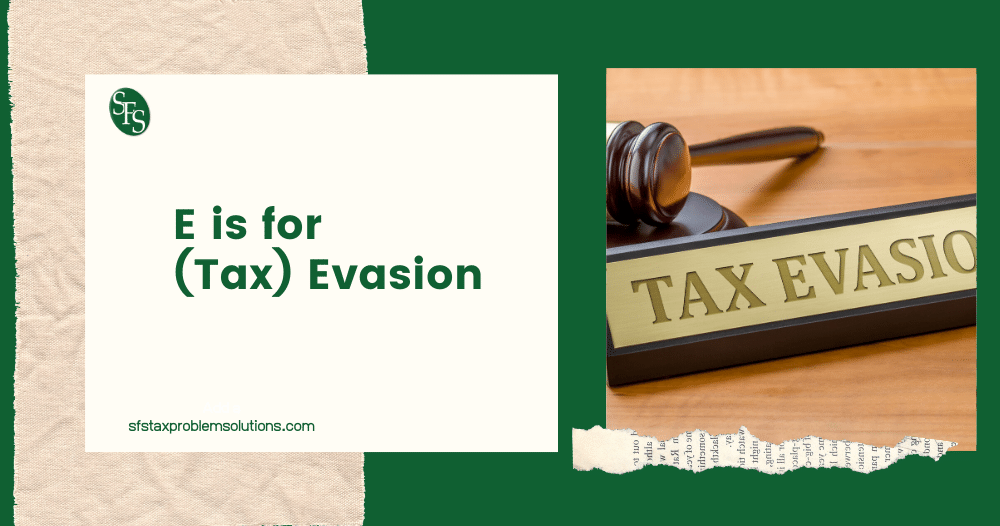E is for (Tax) Evasion
The Tax Resolution Alphabet -E is for (Tax) Evasion. Tax evasion occurs when a person or business illegally avoids paying their tax liability, which is a criminal charge that’s subject to penalties and fines.
Overview:
- Tax evasion can be either the illegal non-payment or underpayment of actual tax liabilities due.
- Tax evasion can be determined by the IRS regardless of whether or not tax forms were filed with the agency.
- To determine tax evasion, the agency must be able to show that the avoidance of taxes was willful on the part of the taxpayer.
- While tax evasion is illegal, tax avoidance includes finding legal ways (within the law) to reduce taxpayer obligations.
What is tax evasion?
Tax evasion is an illegal activity in which a person or entity deliberately avoids paying a tax liability. Individuals caught evading taxes are usually subject to criminal charges and substantial penalties. To willfully fail to pay taxes is a federal offense under the Internal Revenue Service (IRS) tax code.
In order for charges to be levied, it must be determined that the avoidance of taxes was a willful act on the part of the taxpayer. Not only can a person be liable for payment of any taxes that have been left unpaid, but they can also be found guilty of criminal and civil charges and may be required to serve jail time. According to the IRS, the penalties include jail time of no more than five years, a fine of no more than $250,000 for individuals or $500,000 for corporations, or both—along with the costs of prosecution.
When determining if the act of failure to pay was intentional, a variety of factors are considered. Most commonly, a taxpayer’s financial situation will be examined in an effort to confirm if the nonpayment was the result of committing fraud or of the concealment of reportable income. Unlike in an audit where the burden of proof falls to the taxpayer, in a criminal situation the IRS/Department of Justice bears the burden.
E is for (Tax) Evasion
A failure to pay may be judged fraudulent in cases where a taxpayer made efforts to conceal assets by associating them with a person other than themselves. This can include reporting income under a false name and Social Security number (SSN), which can also constitute identity theft. A person may be judged as concealing income for failure to report work that did not follow traditional payment recording methods. This can include acceptance of a cash payment for goods or services rendered without reporting them properly to the IRS during a tax filing.
In most cases of corporate tax evasion listed on the IRS website, the tax liability was underrepresented. Many business owners undervalued the sums of their receipts to the agency, an act which was deemed to be the purposeful evasion of tax. These were documented to be sources of income, revenue, and profits that were not accurately reported.
Don’t let the burden of failure to file and owing back taxes hang over your head any longer. Discover how to solve your tax problem by speaking with us today. Book your appointment today at https://meetme.so/SFSTax or call 877.355.8010.



